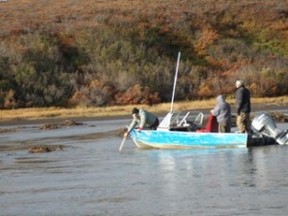Aklavik, Northwest Territories

Year(s) Funded: 2008-2009
Topic Area: Food Security Contact: Susan Chatwood, Institute for Circumpolar Health, [email protected] Partners: Institute for Circumpolar Health Research, Aklavik Health Committee, Moose Kerr School, Arctic Health Research Network and Oxford University Centre Title: Climate as a Health Determinant in the Aklavik Region of the Northwest Territories
Action: In Aklavik, climate change impacts were of immediate relevance to elders and other community members who maintain a traditional life style; traveling, hunting and fishing as their ancestors have done. Designed to complement previous projects, organizers developed a youth-driven, community-based project aimed at engaging Aklavik youth in examining dietary choices and diet-diseases relationships at the community level. The Aklavik Health Committee and community members concerned about community health issues worked with staff and students of Moose Kerr School to develop specific curriculum for the school, an on-the-land retreat and a final video summary. Elders of Aklavik and surrounding areas participated by sharing traditional knowledge and applying past events to current understanding and adaptations to climate change. The work done through this project was integrated into the science curriculum at the high school. Results: Information gathered through this research has been synthesized and discussed within classrooms at Moose Kerr School and has led to a heightened awareness of the research process within the community and region. The project brought together the Elders and youth, and connected Western science through the science curriculum and the traditional knowledge of the Inuvialuit and Gwich’in region. Outputs: A thirty minute video was produced. |
Warmer weather affects the food chain, also the snow that turns into ice and freezes…that gives animals a hard time to get their food underneath the hardened snow.- Inuvik Elder Fred Carmichael |
